GW Pharmaceuticals: Savior of mankind or bane of human existence?
Once upon a time, there was a guy who knew a lot about marijuana. He attended cannabis conferences and participated in presentations. He hobnobbed with a wealthy well-known insurance magnate. Eccentric described him, but he also had a wonky, biochemical side intent on legitimizing marijuana as medicine. He claimed he had “no beef with people who grow, smoke, or provide their own cannabis.” He decried the drug war’s toll on U.S. marijuana policy.
But there was another side. He’s been portrayed as the master mind behind an unfair marijuana monopoly that patents plants, extraction techniques, medicines and extract inhalers – and then sues violators. A Monsanto that resorts to heavy-handed police state scare tactics. A purveyor of prohibition that prevents people from managing personal healthcare or growing personal medicine.
That guy is Dr. Geoffrey Guy, Chairman and Founder of the British company GW Pharmaceuticals that has been developing cannabis-based medicines since 1998. A Cannabis Culture article on the Wayback Machine from 2003 profiled the two sides of Dr. Guy. Did this prescient piece portend the fate of cannabidiol (CBD) in 2018?
The savior
Frequent severe seizures, mental impairment and sometimes death characterize the rare childhood disorders, Lennox-Gastaut and Dravet syndromes. Idiopathic and intractable, conventional treatments often fail. Enter cannabis oil. For years, anecdotal accounts have touted its ability to alleviate seizure activity. In 2013, Charlotte Figi, a five-year old Dravet patient, provided proof after the Stanley Brothers in Colorado developed a CBD strain that virtually eliminated her seizures.
The race was on. The FDA fast tracked Epidiolex® (GW’s oral formulation of CBD), bestowed Orphan Drug Status on it and approved it in June 2018. Relief couldn’t come too soon for the 30,000+ children and adults who suffer from those two conditions.
The bane
If patents are a poser, then GW is guilty. The 40 found on the website of the U.S. Patent Office speak to a monopolistic quest. Worries in 2003 about patents on plants, extraction, medicine and inhalers have all come true.
While cannabidiol for childhood epilepsy is a noble cause, its FDA approval also confers economic benefits. Patents last for 20 years and can be extended. Orphan drugs receive seven years of market exclusivity. Pediatric products can gain an extra six months. If deemed a “New Chemical Entity,” Epidiolex could get another five years. Market exclusivity can run concurrently – or not – with patent exclusivity. Added together, GW could quash generic CBD until 2050.
The FDA views CBD as a highly restricted Schedule I controlled substance. Even so, FDA approval mandates the rescheduling of Epidiolex, likely under Schedule III or IV, permitting insurance coverage and off label prescribing. GW’s version of CBD could then be Rx’d for a multitude of conditions.
There’s more. Epidiolex’s per-patient cost will equal $32,500/year. With GW’s partners including the giants of the pharmaceutical industry – like Bayer, Novartis and Otsuka – Big Pharma stands to make billions from FDA-approved CBD, which is a problem.
In 1988 rescheduling decision, DEA Administrative Law Judge Francis Young ruled that “Marijuana in its natural form is one of the safest therapeutically active substances known to man.” Even the DEA admits no deaths. In fact, CBD can "restructure and normalize" the brain, which may be why it works with epilepsy – and so much more. It’s on the fast track to becoming ubiquitous. In just five years, the hemp-derived CBD market went from zero to $190 million. Hemp, a cousin of cannabis, can be processed into CBD oils and purchased at convenience stores, boutiques and even Walmart. So, what’s Big Pharma to do?
Maybe tank the nascent industry? In May, a three-judge panel of the 9th Circuit Court of Appeals ruled that, outside of the FDA, CBD remains a Schedule 1 controlled substance. The California Department of Health determined in July that CBD cannot be added to food. Back in Ohio, Erin Reid, legal counsel to the Board of Pharmacy, proclaimed dispensaries to be the sole source of CBD in the state, even though none yet exist. Prosecutors in Fairfield and other Ohiocounties have sent cease and desist letters to stores selling CBD. The face of things to come?
Wayback in 2003, Dr. Guy told Cannabis Culture that GW was “not ‘Big Pharma.” He asserted, “people who grow their own have nothing to worry about from GW Pharmaceuticals.” When asked if GW would take legal action, he replied, “Of course not.” GW is not the police. And he concluded, “it’s time to stop this silly debate about it.”
In 2018, with the approval of Epidiolex, that debate has reemerged. CBD faces a lifetime ban, a blanket prohibition. The warning flags of long ago feverishly wave: patents, monopolies, scare tactics. If those fail, enter police, prosecutors and prison.
So, Dr. Guy, you’re at a critical crossroads: what is GW, a savior or a bane?
Disclaimer: This article’s author, Mary Jane Borden, owns a small number of shares in GW Pharmaceuticals that she purchased in 2003. Consider her to be a shareholder activist.
=-=-=
Industrial Hemp Farm Summit – New Date!
Date: November 17, 2018
Time: 11:00 am – 4:00 pm
Location: Delaware County Fairgrounds
Address: 236 Pennsylvania Ave., Delaware, Ohio 43015
Price: $20.00 in advance or $25 at the door
Tickets can be purchased through Eventbrite
Hosted by: Meigs Fertilizer Company
=-=-=-=-=



